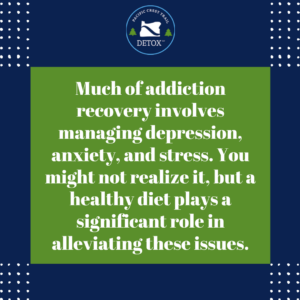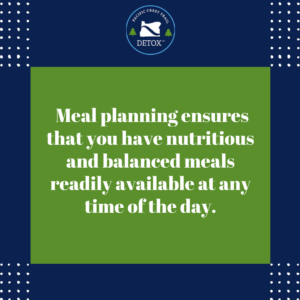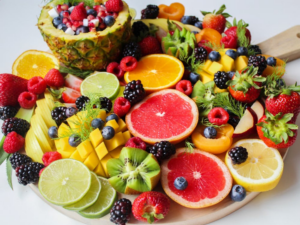Navigating addiction recovery can be challenging. On top of managing your cravings and triggers, prioritizing a nutritious meal might be one of the last things on your mind. However, it’s essential for your recovery.
Need help managing your recovery and diet? Here’s how you can get started.

The Importance Of Nutrition In Recovery
Nutrition is crucial to sustained addiction recovery. Here’s why:
Supporting Physical Health
In addiction recovery, maintaining proper nutrition is vital for your physical well-being. You might have noticed signs of bodily damage, vitamin deficiencies, and low energy levels as a result of substance abuse. These are common, as it can be difficult to prioritize your health during recovery.
Your body will need nutrients and minerals from healthy meals. Replenishing your immune system in this manner will help you recover from your existing diseases and infections. Additionally, it will protect you from further health complications.
Enhancing Mental Health
While everyone talks about how food is crucial for your physical health, it also does great things for your mental health.
Much of addiction recovery involves managing depression, anxiety, and stress. You might not realize it, but a healthy diet plays a significant role in alleviating these issues. Meals rich in vitamins, minerals, and antioxidants are linked to improved mental well-being.
Building A Routine
Making the conscious effort to plan your meals and maintain eating habits will nourish your body. It will also give you a routine to follow. Knowing what comes next could help manage your triggers, cravings, and addiction-induced anxiety. This will also promote your self-discipline, which is beneficial in long-term recovery.
Basic Nutritional Guidelines
To ensure that you are healthy during recovery, you have to eat right. Here are some guidelines to get you started:
Balanced Diet
A balanced diet will look like a healthy mix of proteins, carbohydrates, fats, vitamins, and minerals.
Protein will repair any damage from substance use and build your stamina. Staple examples of protein include lean meat, fish, and beans. Fats have a bad reputation, but healthy fats in avocado, olive oil, and nuts are great for your brain and heart health. It’s also important that your meals satiate you, so don’t forget your carbohydrates.
Hydration
Water regulates your body temperature, transports nutrients, and flushes out your bodily toxins. Aim to drink at least eight glasses of water a day, and include lots of fruits and vegetables in your diet. It would also be best to regulate caffeine and alcohol intake to prevent dehydration.
Regular Meals
Eat three balanced meals and space these out during the day. These meals should include a variety of food groups to ensure you’re getting your nutrients and minerals.
In between meals, have nutritious snacks like mixed nuts, yogurt, and fruit to provide you with energy.
Practical Eating Tips For Recovery
If you’re feeling a little overwhelmed by all these rules, here are some tips that might help:
Meal Planning
It’s normal to think that nutritional planning may be tiring and a waste of time. But it’s great for addiction recovery. Meal planning ensures that you have nutritious and balanced meals readily available at any time of the day.
Set aside a day or two every week to plan your meals, and partner these plans with a shopping list. This will not only sustain your dietary preferences and needs but it also saves time, minimizes stress, and keeps you on the budget.
Healthy Snacks
When stressed from addiction recovery, you may find yourself reaching for some snacks. However, these will not sustain your energy. Instead, opt for nutritious snacks to manage your hunger. It would also be a great idea to lessen the friction by having them prepared and pre-portioned. Try out fruit slices with peanut butter to start.
Mindful Eating
Take the time to sit down and enjoy each bite. Eat slowly, and pay attention to the flavors and textures of your food.
Listen to your body for cues of hunger and fullness. Eat until you are full, and stop when you are satisfied.
Dealing With Common Challenges
It’s normal for you to encounter challenges while trying to eat healthy when you’re trying to recover from addiction. Here are some strategies to help you during these times:
Managing Cravings
A common challenge in battling substance abuse is dealing with cravings–not just for substance use, but also for sugar and other unhealthy food.
Turn to healthier alternatives available to you, like fruits, nuts, or yogurt. You could also distract yourself by taking a walk, doing deep breathing exercises, or talking with your loved ones.
Addressing Appetite Issues
You may find yourself with a small appetite, not wanting to eat at all, or eating everything.
Make a habit of eating small and frequent meals throughout the day instead of large portions. Ensure that these meals have a good mix of vitamins, carbs, and fats to keep you satisfied. And remember, you are allowed to add food that makes eating more enjoyable.
Avoiding Quick Fixes
To prevent crashes and mood swings, avoid caffeine and sugar when you are low on energy. Instead, eat whole grains, lean protein, and fruits to keep you energized for longer.
Stay hydrated during the day by drinking water or herbal tea, and get enough good quality sleep at night.
Conclusion
Prioritizing nutrition during recovery is crucial for both your physical and mental well-being. It will be challenging, but stick to basic nutritional guidelines you can follow and partner these with practical tips. Eat food you enjoy, space and plan your meals, and stop when you are full.
Eating a healthy diet is crucial for maintaining your addiction recovery. Just as you approach your substance use recovery with patience, kindness, and compassion, you should treat your nutritional choices the same way. For additional tips and strategies, feel free to contact Pacific Crest Trail Detox today!



